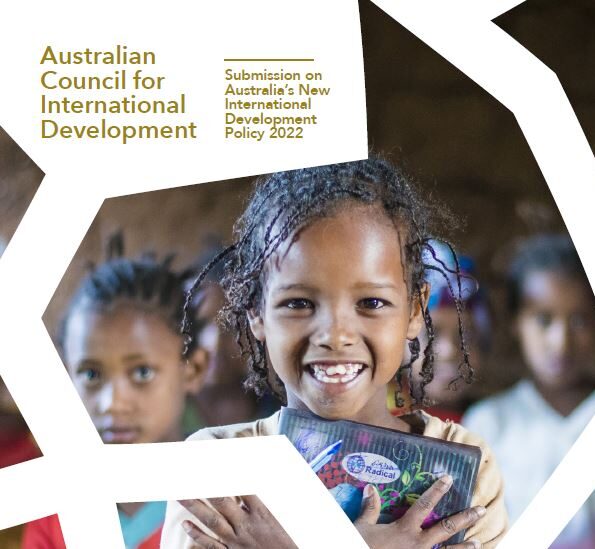The Australian Council for International Development (ACFID) has called on the Australian Government to make human development and navigating climate change the cornerstones of its international development program.
In its submission to the new development policy process, ACFID has pressed the urgent need to face up to complex problems, including their root causes and their ongoing impacts. ACFID is also strongly advocating for the UN-adopted Sustainable Development Goals (SDGs) to be affirmed in the purpose of Australia’s development policy.
The policy update, announced by the Albanese Government in October, aims to reset Australia’s international development program for the years ahead. It positions development as a critical element of how Australia engages with the world.
After a development strategy focused on responding to COVID-19 in 2020, this new policy is the most significant opportunity for the Government to prepare for forthcoming challenges.
The combination of COVID-19, climate change and conflict has created the perfect storm, exacerbating existing inequalities. For the first time in more than 20 years, extreme poverty around the world is rising. Australia needs a development program that can address these global challenges and prepare for the future.
The ACFID submission calls for a policy that guides an Australian development program which places people at the centre of sustainable and inclusive development. It should commit to listening to and supporting communities and governments in the Indo-Pacific region and further afield to meet their needs and development priorities.
Key objectives for the program should include: inclusive and rights-based development; the need to address the root causes of crises; and to meet Australia’s fair share on global targets and international commitments.
ACFID has also made a submission calling on the Australian Government to reinvigorate its humanitarian strategy. Australia’s humanitarian policy should be driven by need; move towards a locally led model; make clear the need to act early to prepare for disasters; focus on marginalised communities; and be transparent.
“This is a once-in-a-decade opportunity to inform how Australia delivers effective development cooperation and responds to the priorities of our partners,” said ACFID CEO, Marc Purcell.
“As the peak body representing 130 member organisations, our view is that it is vital that climate change considerations, as an existential threat in our region, are key to a long-term plan, and that human development is the ultimate objective. We want to make security, inclusivity, and prosperity something that can be shared by all, not just rich countries,” said Mr Purcell.
“International development cooperation is a vital tool of statecraft, and must reflect our country’s diversity, history and values.”
Key to ACFID’s position is that positive and fruitful partnerships should be what powers the program – and not countering geopolitical rivals. The new policy should be implemented over a ten-year period.
The Pacific Islands Association of Non-governmental Organisations (PIANGO) also made a submission which focuses on Pacific community priorities of climate change; the need for locally led approaches; the need to protect civil society and civic space; and inclusive development. ACFID supports its Pacific counterparts in their asks.
ACFID’s submissions can be read in full here: https://acfid.asn.au/acfids-submissions-to-the-australian-governments-new-development-policy/
Key Priorities
These include:
Civil Society – Globally, we are seeing a shrinking of civil society space, rising illiberalism, and democratic backsliding. Human rights violations and backlash against human rights defenders are increasing, and the ability of citizens to meet, debate, and collaborate has been constrained. Shrinking civic space is a risk to the economic recovery, prosperity, and stability of states in our region and beyond.
Climate Change – Climate change brings immense social, economic and environmental costs, and challenges international stability and prosperity. Already vulnerable groups and countries have the most to lose. Australia continues to fall short of international obligations to mitigate emissions and provide adequate climate financing.
Gender, Children and Disability Inclusion – Marginalised groups are most impacted by poverty, climate change, disasters and crises. The pandemic has further exacerbated inequality around the world. We urgently need to protect and restore hard-won human rights for marginalised groups.
Locally led development – Development cooperation is most effective if it is led by partners and development actors in the countries where we work. By yielding power to local actors, Australia will better protect and support the resourcing, autonomy, and sovereignty of development partners, who have long been asking us to listen to and support their priorities.
Humanitarian – Compounding, complex, and long-lasting crises have become the new normal. Climate change, rising conflict, challenges to the global rules-based order and the hunger crisis are broadening the scale and geographic scope of humanitarian need, and Australia needs to refocus on humanitarian work and principles that are capable of dealing with future challenges.
Key Recommendations
Inclusion: Mainstream a focus on women, people with disabilities, children and youth, First Nations and from diverse sexual orientations.
Civil Society: Establish a civil society (CSO) hub in DFAT, to strengthen engagement with civil society across the development program.
Locally led processes: Develop a practical roadmap for how Australia’s development program can efficiently move towards locally led approaches – including targets for local leadership in the design, delivery and evaluation of aid programs.
Humanitarian: The Governments new Humanitarian Strategy should have a global focus, be effective and inclusive and address the root causes of crises and displacement.
Long-term partnerships: The Australian Government should establish tailored, 10-year development cooperation partnership agreements (DCPAs) with partner nations. This would bring stability and focus to relationships.
Development knowledge: Strengthen and value development knowledge at all levels of DFAT and harness specialist expertise. This would include bringing back skills that have eroded away in recent years, such as in climate change, gender and disability inclusion.
Long-term budget planning: Set out a long-term budget framework over 10 years to support the delivery of the international development policy, aligned to the 10-year DCPAs with key partner countries.
For more information or to arrange an interview, please contact [email protected] or call 0401 721 064.









